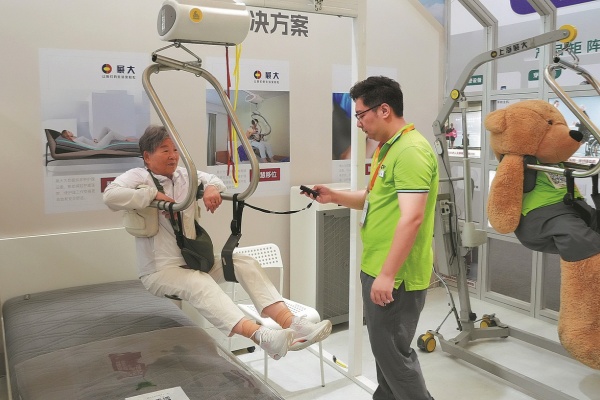
- Home
- Media Center
-
Events
- Wuzhen Summit
- Regional Forums
- Practice Cases of Jointly Building a Community with a Shared Future in Cyberspace
- World Internet Conference Awards for Pioneering Science and Technology
- The Light of Internet Expo
- Straight to Wuzhen Competition
- Global Youth Leadership Program
- WIC Distinguished Contribution Award
- Membership
- Research & Cooperation
- Digital Academy
-
Reports
- Collection of cases on Jointly Building a Community with a Shared Future in Cyberspace
- Collection of Shortlisted Achievements of World Internet Conference Awards for Pioneering Science and Technology
- Reports on Artificial Intelligence
- Reports on Cross — Border Ecommerce
- Reports on Data
- Outcomes of Think Tank Cooperation Program
- Series on Sovereignty in Cyberspace Theory and Practice
- Other Achievements
- About WIC
- 中文 | EN

Shanghai to revolutionize elderly care
City plans to use AI, robots and smart solutions to improve senior living

An exhibitor demonstrates equipment to safely transfer a senior from a chair to a bed at an elderly care exhibition in Shanghai on June 13. [Photo for China Daily]
Shanghai has launched a comprehensive action plan to revolutionize elderly care services and address the challenges posed by its rapidly aging population.
According to the plan, the city aims to harness cutting-edge technology to enhance the quality of life for seniors and emerge as a global leader in technological innovation and industrial advancement in elderly care by 2027.
The plan encompasses the establishment of an elderly care technology industrial park, state-of-the-art incubators, enterprise innovation hubs and research platforms. Central to the initiative is the nurturing of leading enterprises, the creation of demonstration sites for elderly care technology products, and the application of these innovations to cater to diverse needs.
Specifically, the plan highlights the integration of artificial intelligence technology, calling for the development of AI models and algorithms for voice, facial, emotion and motion recognition and environmental perception.
It aims to enhance the autonomous perception, learning, decision-making and execution capabilities of elderly care technology products through the development of embodied intelligence and generative artificial intelligence technologies.
In terms of key product development, the plan categorizes products into six groups such as life assistance, health services and rehabilitation aids, with a particular focus on robots.
Various types of robots including rehabilitation, exoskeleton, nursing and companion robots are mentioned multiple times in the plan. Embodied intelligent or humanoid robots are seen as a key solution to address the significant shortage of elderly care nursing staff in China.
Various initiatives have already been launched to integrate embodied intelligent robots with the silver economy.
On the national level, the National Development and Reform Commission and other departments issued measures to expand the functions of intelligent robots in various sectors, including elderly care, on June 24.
At the 2024 World Artificial Intelligence Conference, the Intelligent Robotics Institute of Fudan University's Academy for Engineering and Technology showcased Guanghua No 1, a care robot for the elderly, which exhibits significant improvements in assisting the elderly and emotional responsiveness.
Gan Zhongxue, deputy dean of the Academy for Engineering and Technology of Fudan University, emphasized the importance of emotional engagement in elderly care and health services.
He highlighted that genuine care requires emotional intelligence and warmth, qualities that can be provided by humanoid robots like Guanghua No 1.
To drive the application and showcase the potential of these innovative products, the plan outlines initiatives to expedite the adoption of smart aging solutions, encourage the utilization of intelligent elderly care products in care facilities, and establish demonstration centers for elderly care technology products. Additionally, support will be extended to independently developed elderly care technology products and explore insurance coverage options for these cutting-edge solutions.
The plan also underscores the significance of fostering a conducive environment for industry growth by backing enterprise innovation, establishing high-caliber incubators, fostering industry clusters, and fortifying standard systems to ensure seamless integration and interoperability of elderly care technology products.

The World Internet Conference (WIC) was established as an international organization on July 12, 2022, headquartered in Beijing, China. It was jointly initiated by Global System for Mobile Communication Association (GSMA), National Computer Network Emergency Response Technical Team/Coordination Center of China (CNCERT), China Internet Network Information Center (CNNIC), Alibaba Group, Tencent, and Zhijiang Lab.





